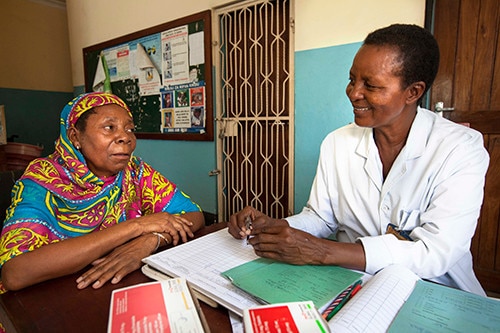Since 2007 APOPO has supported national clinics and helped increase detection rates by 40%. Operations began in Morogoro at the training and research center and in 2016 a new testing facility was opened in Dar es Salaam to get to the heart of TB response.
Background
Tanzania is one of the world’s 30 TB high-burden countries. Like most economically challenged countries, Tanzania’s government clinics largely rely on smear microscopy that has a low sensitivity of about 20-60%, so many TB-Positive patients are missed. This is exacerbated by challenging factors such as inadequate funding for training and equipment, power and water cuts and lack of staff. As a result, only about half of the visiting patients with active TB are correctly diagnosed, leading to further fatalities and the disease being passed on to the families and colleagues of the missed patient.
 APOPO in Tanzania
APOPO in Tanzania
The TB detection research program in Tanzania was launched in mid-2007 in partnership with four government clinics. It has since expanded to 80 collaborating clinics in Dar es Salaam city, Dodoma city, Coast and Morogoro regions, and a new APOPO testing facility opened in 2016 in Dar es Salaam. APOPO collects sputum samples that have already been tested by microscopy in the partner clinic labs and retests them using TB-detection rats and WHO-endorsed confirmation tests, resulting in a detection rate increase of about 40%.
Dar es Salaam testing facility
The facility in the city delivers APOPO results within 24 hours, so patients get them when they return to the clinic for their standard results, vastly increasing the number of people getting treatment and decreasing time spent tracking down patients who have already returned home. In fact, the same model implemented since October 2015 at the APOPO facility in Maputo, Mozambique, has increased treatment initiation rates by 25%, on top of the 40% increase in initial TB detection. There are 10 TB-detection rats working at the lab alongside 12 staff made up of rat handlers and lab technicians.
Linkage-to-Care
Partnerships with community-based organisations greatly improve patient tracking and the treatment of additional patients. Our partner MUKIKUTE in Tanzania is made up of volunteer community healthcare workers who, using software and tablet technology (eCompliance) supplied by partner OpASHA, carry out efficient tracking and monitoring of patients. This eCompliance project saw TB-patient treatment adherence increase from 65% to 98% over the course of the project. By helping to fill the gap in diagnosis and enhance linkage to care, APOPO aims to support one of the recent WHO pillars of its strategy to end TB – ‘achieve universal health coverage by strengthening health systems and improving access to people-centred TB prevention and care so no one is left behind’.By helping to fill the gap in diagnosis and enhance linkage to care, APOPO aims to support one of the recent WHO pillars of its strategy to end TB – ‘achieve universal health coverage by strengthening health systems and improving access to people-centred TB prevention and care so no one is left behind’.

 APOPO in Tanzania
APOPO in Tanzania